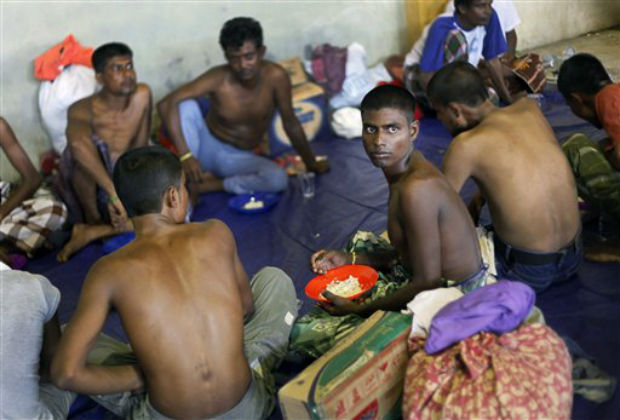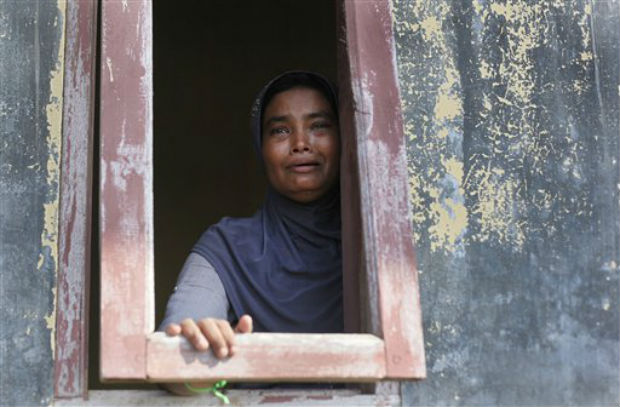Malaysia turns away boat with more than 500 migrants

Bangladeshi migrants have their lunch at a temporary shelter for the migrants whose boats washed ashore on Sumatra island on Sunday, in Lhoksukon, Aceh province, Indonesia, Wednesday, May 13, 2015. AP
LANGKAWI, Malaysia — Malaysia has turned away a boat with more than 500 Rohingya Muslims and Bangladeshis after providing them with fuel and provisions, a government official said Thursday.
The boat was found Wednesday off the coast of northern Penang state, just days after more than 1,000 refugees landed in nearby Langkawi island.
Deputy Home Minister Wan Junaidi Jaafar said that Malaysia cannot afford to have immigrants flooding its shores, adding the government has treated immigrants humanely but “now it’s about time to show they are not welcome here.”
He said countries in Southeast Asian must now press Myanmar to resolve the Rohingya crisis.
Thousands of migrants are still believed stranded in the Malacca Strait and surrounding waters, after captains tied to trafficking networks abandoned ships, leaving behind their human cargo.
Article continues after this advertisementIndonesia, which has taken 600 such refugees, turned a boat away earlier this week. But a foreign ministry spokesman denied Wednesday it had a “push back” policy, saying the vessel strayed into its waters on accident. Arrmanatha Nasir told reporters the migrants were looking for neighboring Malaysia.
Article continues after this advertisement“We have to help refugees who need assistance and direct them to where they want to go,” he said. “It goes against our principle to chase away refugee boats that enter our territory.”
Southeast Asia, which for years tried to quietly ignore the plight of Myanmar’s 1.3 million Rohingya, now finds itself caught in a spiraling humanitarian crisis that in many ways it helped create.
In the last three years, more than 100,000 members of the Muslim minority have boarded ships, fleeing persecution, according to the U.N. refugee agency.
No countries want them, fearing that accepting a few would result in an unstoppable flow of poor, uneducated migrants. But governments at the same time respected the wishes of Myanmar at regional gatherings and avoided discussions of state-sponsored discrimination against the Rohingya.
Denied citizenship by national law, the Muslims are effectively stateless. They have for years faced attacks by the military and extremist Buddhist mobs. They have limited access to education or adequate health care and cannot move around freely.
“Towing migrants out to sea and declaring that they aren’t your problem anymore is not a solution to a wider regional crisis,” said Charles Santiago, a member of parliament in Malaysia.
Increasingly over the years, Rohingya boarding boats in the Bay of Bengal have been joined by neighboring Bangladeshi, most of them seeking an escape from poverty.
For those fleeing, the first stop, up until recently, was Thailand, where migrants were held in jungle camps until their families could raise hefty ransoms so they could continue onward. Recent security crackdowns forced the smugglers to change tactics, instead holding people on large ships parked offshore.
Initially they were shuttled to shore on smaller boats after their “ransoms” were paid. But as agents and brokers on land got more and more spooked by arrests not just of traffickers but also police and politicians, they went into hiding.
That created a bottleneck, with migrants stuck on boats for weeks, even months, at a time.
Chris Lewa of the non-profit Arakan Project estimates as many as 6,000 may still be on boats, waiting to find a chance to land or hoping to be rescued.
In recent days, captains have started abandoning their ships, leaving passengers to fend for themselves.
The United Nations has pleaded for countries in the region to keep their borders open and help rescue those stranded.
Several navies said they were scouring the seas.
Capt. Chayut Navespootikorn of the Royal Thai Navy of Operation Fleet Area 3, said several boats and aircraft had been deployed to search the country’s territorial waters, but nothing has turned up.
No rescues have been made by other navies either.
The condition of people on the ship off Penang was not immediately known, said Zafar Ahmad, who heads the Myanmar Ethnic Rohingya Human Rights Organization of Malaysia: “We are hearing their plight is desperate.”
The information was corroborated by another person with knowledge of the situation. That person was not authorized to speak to the media and asked to remain anonymous. Government officials could not immediately be reached for comment.

An ethnic Rohingya woman weeps as she looks outside from a window at a temporary shelter for the migrants whose boats washed ashore on Sumatra island on Sunday, in Lapang, Aceh province, Indonesia, Wednesday, May 13, 2015. AP
RELATED STORIES
8,000 more Rohingya flee Myanmar—expert